The U.S. House committee investigating the Jan. 6, 2021, attack on the U.S. Capitol by a violent, pro-Trump mob will focus Tuesday on the former president’s pressure campaign against state-level officials.
In hearings so far, the lawmakers have outlined how they believe the former president and extremist groups carried out the attack that day. But Jan. 6 was the culmination of years of political violence. Oregon and other states served as a training and ideology testing ground for the groups who would go on to play leading roles in the insurrection. The committee’s last scheduled hearing is Thursday.
Below is a retrospective of some key events that show how Oregon was central to escalating political violence leading up to the Capitol assault.
Patriot Prayer
Patriot Prayer, a Vancouver-based far-right group formed in 2016, served as a template for smaller groups around the country that would carry out violent street protests targeted at an ever-shifting array of cultural issues and people aligned with liberal causes.
Patriot Prayer first rose to prominence by holding a series of “free speech” rallies in Portland and other West Coast cities in the years following its founding. The group helped center “Antifa,” a decentralized group of people who oppose far-right extremism, as a leftist bogeyman in far-right psyches. Following the attack on the Capitol, several prominent conservatives — including Texas Sen. Ted Cruz and Fox News’ wildly popular conspiracy theorist Tucker Carlson — described the attack as a false flag operation by the FBI or antifascists, rather than backers of the former president.
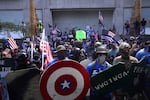
Dueling demonstrations gather in downtown Portland, Ore., Saturday, Aug. 22, 2020. Groups like Proud Boys and Patriot Prayer showed up downtown to oppose monthslong demonstrations against systemic racism and police brutality.
Jonathan Levinson / OPB
Patriot Prayer’s years of demonstrations were regularly met by counterprotests and frequently devolved into violence, helping cement Portland as a central battleground between the far-right and leftist activists. An estimated 150 Patriot Prayer supporters turned out to a June 2018 demonstration in downtown Portland. Attendees openly brawled with leftist counter-demonstrators, who federal law enforcement shot with less-lethal crowd control munitions.
Joey Gibson, the group’s founder, told prominent conspiracy theorist Alex Jones that Gibson’s reason for going to Portland so often is that the city “is full of so much darkness,” calling Portland one of the worst cities in the country. That characterization became increasingly popular in the lead up to the U.S. Capitol attack, and in 2020 the Trump administration deployed hundreds of federal officers to violently crackdown on racial justice protests in the city.
“Make no mistake, this leftwing cultural revolution is designed to overthrow the American revolution,” the twice-impeached former president told a July 3, 2020 crowd at Mount Rushmore.
Patriot Prayer’s claimed affinity for free speech and the Constitution has tested the limits of a justice system that experts on authoritarianism and criminal justice say is ill-equipped to address the growing threat to democracy in the U.S. That hasn’t stopped prosecutors in Multnomah County from trying.
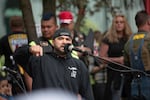
A 2017 file photo of Patriot Prayer leader Joey Gibson addressing a crowd at a rally and holding a moment of silence for the victims of the Portland MAX train stabbings.
Bryan M. Vance / OPB
A number of Patriot Prayer members have faced criminal charges. Skyler Jernigan, a lower-level participant, was convicted of unlawful use of a weapon and recklessly endangering another person after he fired a gun during a downtown Portland demonstration in 2019. Meanwhile, Gibson is facing felony riot charges for leading a violent May Day street brawl with anti-fascists in front of Cider Riot in Southeast Portland.
Oath Keepers militia
In 2017, during a Portland rally organized by Gibson, members of a militia assisted law enforcement from the Federal Protective Services in arresting an antifascist counterdemonstrator. The incident was one of many around the country pointing to a resurgent militia movement becoming more accepted in conservative circles.
For years, a militia called the Oath Keepers, founded in 2009 by Army veteran and Yale Law School graduate Elmer Stewart Rhodes, prominently led the resurgence. The group recruits people with experience in law enforcement and the military to prepare for what the organization characterizes as an inevitable armed conflict with the U.S. government.
The Oath Keepers were front and center in a 2015 armed standoff between the Sugar Pine Mine operators and Bureau of Land Management in Southern Oregon. A leader of the Oath Keepers in Southern Oregon who helped organize at Sugar Pine Mine would go on to run for political office in Josephine County in 2016, and serve as a party delegate to support Trump at that year’s Republican National Convention.
An OPB investigation last year also revealed more than two dozen Oregon law enforcement officers had joined the Oath Keepers since its founding.
In the years before Jan. 6, Oath Keepers enjoyed an often cozy relationship with conservative Oregon politicians, including county sheriffs, commissioners and state representatives. In 2017, the Multnomah County GOP passed a resolution, approving the hiring of Oath Keepers and other militia members as security for Republican events.
The group would go on to play a central role in the insurrection. According to a federal indictment, Rhodes and 10 other members reconnoitered the Capitol grounds in the days before Jan. 6, staged an armed quick reaction force just outside D.C., and were captured on video wearing tactical gear while methodically making their way through the crowd toward the capitol entrance in a military-style “stack” used to breach buildings.
Rhodes and 10 others have been charged with seditious conspiracy for their role in the attack. Two pleaded guilty, Rhodes and eight others pleaded not guilty.
Proud Boys
As Portland streets became a more frequent host for the nation’s violent political right, the Proud Boys became an increasingly common presence at rallies in the region. The Proud Boys are a far-right, extremist group that engages in street violence. In 2018, a Clark County Sheriff’s Office internal investigation revealed for the first time that the FBI had classified the Proud Boys as “an extremist group with ties to White Nationalism.”
A Clark County prosecutor confirmed at the time that the FBI had briefed the agency.
The investigation was prompted by photographs of former Deputy Erin Willey wearing Proud Boys apparel. She was ultimately fired for violating the department’s non-discrimination and anti-harassment policies.
“The FBI has warned local law enforcement that the Proud Boys are actively recruiting in the Pacific Northwest and that some in the group have contributed to the escalation of violence at political rallies held on college campuses, and in cities like Portland, Oregon and Seattle, Washington,” the report said.
The FBI briefing came after a 2018 Patriot Prayer rally in Portland, which was attended by a number of Proud Boys members. Two months after the briefing, the Proud Boys provided security for a Patriot Prayer-led “flash march for Law and Order” to disrupt a memorial set up for Patrick Kimmons, a Black man who had recently been shot and killed by Portland police.
A few months after that, in January 2019, local Proud Boy Reggie Axtell posted a video threatening Portland Mayor Ted Wheeler, saying his days were numbered.
“I promise you this, Ted Wheeler: I’m coming for you, you little punk,” Axtell said in the video.
The frequency of Proud Boys coming to Portland increased as the 2020 presidential election drew closer.
In August 2019, Proud Boys from all over the country descended on Portland for a “Stop Domestic Terrorism” rally against Antifa. Leading the way was Joe Biggs, a prominent national Proud Boys organizer.
Fears of widespread violence at the rally failed to materialize in the face of a sizable law enforcement mobilization which appeared more determined than what the group would face at the Capitol on Jan. 6, though Wheeler’s request to have National Guard soldiers on standby was rebuffed by Gov. Kate Brown.
In August 2020, the Proud Boys showed up for a much smaller “No Marxism in America” rally directly in front of the Multnomah County Justice Center. That event quickly unraveled into an hours-long, violent street clash between local Proud Boys and antifascist counter demonstrators. Police were nowhere to be found while Proud Boys brandished firearms and notorious member Tusitala “Tiny” Toese — wanted for a probation violation stemming from an early assault conviction — paraded openly in front of police headquarters.
The following month, Biggs brought a national contingent of Proud Boys back to Portland, this time with national chairman Enrique Tarrio in tow. The rally, which the group claimed would attract crowds in the thousands, barely crested 300 people and fizzled after about 90 minutes in the face of a massive statewide response and large counterdemonstration. Gov. Kate Brown, taking a sharper tack after a year of escalating unrest in the state, declared a state of emergency and created a unified command under the Oregon State Police.
After years spent stoking political violence and refining tactics in Portland and cities across the country, a federal indictment now claims Biggs was one of the first people to enter the Capital on Jan. 6. He and four other Proud Boys, including Tarrio, have been charged with seditious conspiracy for their role in the insurrection.
The U.S. Department of Justice alleges Tarrio, Biggs and the other Proud Boys defendants used violence and a coordinated plan to “prevent, hinder and delay the certification of the Electoral College vote, and to oppose by force the authority of the government of the United States.”
Aligning with government
In 2020, the once fringe ideas of the far right that had been mostly unchecked in Oregon became official government talking points.
That summer, Acting Secretary of Homeland Security Chad Wolf slipped into Portland unannounced to denounce the “violent mob” he claimed had laid siege to the city for 47 days.
“Each night, lawless anarchists destroy and desecrate property, including the federal courthouse, and attack the brave law enforcement officers protecting it,” his statement said.
Portland protesters had risen up alongside the rest of the country in response to George Floyd’s murder at the hands of Minneapolis police officer Derek Chauvin.
Seasoned leftist activists and residents who already had a fraught relationship with their police quickly saw officers violently crack down on those racial justice demonstrations.
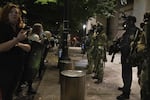
Protesters demonstrate against racism and police violence in front of the Mark O. Hatfield federal courthouse on July 12, 2020. Earlier in the night, federal law enforcement officers shot a demonstrator in the head with a so-called "less-lethal" impact munition, causing severe injury.
Jonathan Levinson / OPB
Wolf’s visit came at the apex of the turmoil. The language he used to describe the city came from a political playbook that had been refined over years and deployed with renewed vigor in service to Trump’s flagging reelection campaign.
When Wolf visited Portland in July, video streamed out of the city every night showing tear gas engulfed streets and camouflage clad federal officers from elite tactical units running roughshod over crowds of moms, veterans and scores of other protesters.
Former President Donald Trump’s campaign quickly repackaged nightly footage in press briefings and campaign ads, suggesting Democratic-run cities were anarchic and what voters could expect in Biden’s America.
Propagated by the highest levels of government and many in law enforcement, by the end of 2020, a once extreme and paranoid belief had rooted itself in mainstream conservative America.
At the tail end of the summer, wildfires broke out across the state. Rather than evacuate, many residents in rural communities just outside of Portland hunkered down, believing rumors that bands of roving antifascist looters had lit the fires intentionally as a pretext to rob their homes. Some law enforcement officers working in the evacuation zones promoted the idea.
At the end of 2020 — two weeks before what lawmakers have called an “attempted coup” at the U.S. Capitol — Oregon was once again an extremist testing ground.
On Dec. 21, 2020, state Rep. Mike Nearman opened a door to the locked Oregon Capitol building, allowing a mob of far right protesters into the building for a confrontation with lawmakers inside debating COVID-19 restrictions. A later investigation found Nearman “more likely than not” opened the door on purpose.
Oregon was by no means alone. In the months leading up to Jan. 6, far-right demonstrators attempted to break into the Washington state governor’s mansion and staged an armed takeover of the Michigan statehouse.
Foreshadowing the insurrection that would take place in Washington D.C., the demonstrators who breached the Oregon Capitol battled their way past Oregon State Police, spraying some with bear mace. At least three of the participants in Salem would travel to D.C. for a second attempt, this time on a larger stage.
David Anthony Medina, 31, Tim Davis, 59, and Richard Lee Harris, 41, all participated in the Salem and U.S. Capitol attacks.
At least 11 people from Oregon and Washington have been charged for their role in the Jan. 6 insurrection, including Harris. Among the most serious charges brought against Pacific Northwest defendants, Oregon Proud Boys member Jonathan Allen Klein and his brother Mathew Leland Klein both face a conspiracy charge.
Prosecutors allege the brothers helped members of a second or third wave of the attack climb a wall to gain access to the upper west terrace of the Capitol.
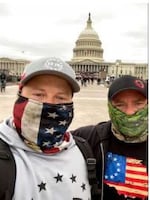
Jeremy Grace and his father, Jeffery Grace, face charges for their alleged involvement in the attack on the U.S. Capitol on Jan. 6.
FBI
Matthew Klein also faced charges for carrying a loaded firearm at a September 2020 Proud Boys rally.
The year before Reed Knox Christensen broke into the U.S. Capitol, he served in a leadership role on the Washington County Republican Party’s Central Committee. Among his charges: engaging in an act of physical violence in the Capitol building.
Father-son duo Jeffrey and Jeremy Grace have both been charged for their role in the insurrection. Since his arrest, Jeffrey Grace has traveled armed to demonstrations in El Paso, Texas, and downtown Portland.
A judge barred him from possessing firearms in response.
The fringe goes mainstream
Despite being at the center of the largest criminal investigation in U.S. history, the Proud Boys and other far-right actors have only become more salient in Republican politics. Since the insurrection, the Proud Boys’ embattled leadership are following through on a longstanding plan to shift their focus from street brawls to local elections.
“I’ve always said my goal for this year ... was simple,” Tarrio told NPR’s All Things Considered last June. “Start getting more involved in local politics, running our guys for office from local seats, whether it’s a simple GOP seat or a city council seat.”
At least six current and former Proud Boys currently sit on the Miami-Dade Republican Executive Committee, according to the New York Times. In California, Proud Boy Jeffrey Erik Perrine, who had been ousted by the Sacramento County Republican Party, got 5.3% of the vote in the June 7 primary for state assembly.
In Oregon, Proud Boy Dan Tooze won nearly 40% of the vote in the Republican primary for House District 40 which represents Oregon City and Gladstone. Adam Baker edged out Tooze for the nomination with 59.7% of the vote.
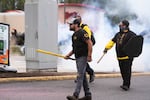
Proud Boys member Dan Tooze carries a bat during a brawl with anti-fascist counterprotesters in Northeast Portland's Parkrose neighborhood on Aug. 22, 2021 in Portland, Oregon.
Jonathan Levinson / OPB
In California’s Shasta County, a successful local militia-backed recall campaign against a Republican county supervisor gave far-right representatives a majority on the county board.
Speaking to KQED in January, recalled supervisor Leonard Moty said people were being bullied into silence.
“This feels very much to me like the Nazi Party in the early ‘30s of Germany, where, you know, they came out with their brown shirts and they intimidated people,” Moty said.
